May 21, 2025 | 05:08 GMT +7
May 21, 2025 | 05:08 GMT +7
Hotline: 0913.378.918
May 21, 2025 | 05:08 GMT +7
Hotline: 0913.378.918
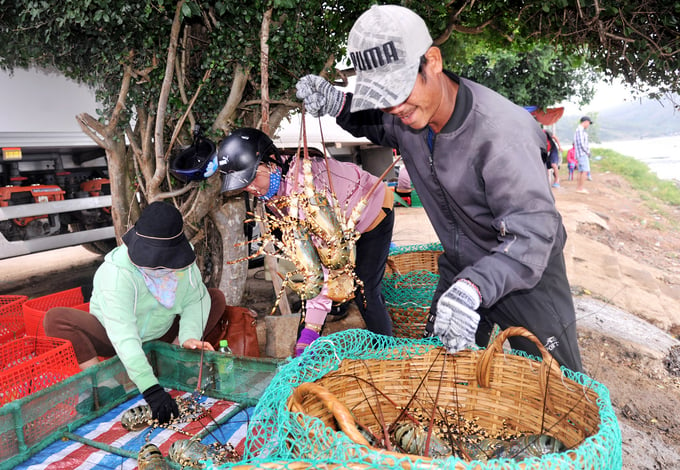
The lobster, being a valuable economic commodity, requires a brand positioning. Photo: KS.
Scheduled for November 15, 2023, the Ministry of Agriculture and Rural Development will host the Forum on "State of Breeding Stock, Feed, and Aquaculture Supplies; Tracing Product Origin and Sustainable Development Solutions for Vietnam's Aquaculture" in Nha Trang city, Khanh Hoa province.
Forum Agenda: Management of lobster breeding stock, sustainable lobster farming solutions; Tracing the origin of lobsters and aquaculture products to meet market demands; Control of imported aquaculture breeding stock; Research and production of industrial feed, various supplies for aquaculture; the state of the seafood market at year-end and projected outlook for 2024.
According to lobster farmers in the South Central coast, local residents are anticipating the involvement of the local governments as well as the Agricultural and Rural Development sector in setting the framework for the lobster farming industry.
Mr. Tran Minh Hien, head of the lobster farming cooperative in Khai Luong village, Van Thanh commune, Van Ninh district, Khanh Hoa province, believes that establishing a lobster value chain from production, purchasing, and export linked in association with source traceability for official exportation is highly essential.
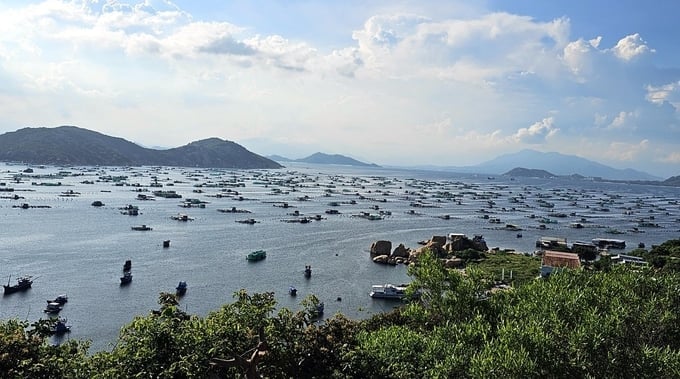
Lobster farming on Cam Ranh Bay, Cam Ranh city, Khanh Hoa province. Photo: KS.
"An established value chain from input to output will reassure the farmers. Harvested lobsters that cannot be sold will have greatly reduced quality. As a result, farmers are anticipating a well-regulated framework for lobster farming to avoid seasonal price fluctuations," expressed Mr. Hien.
According to Mr. Le Van Hoan, Deputy Director of the Khanh Hoa province's Department of Agriculture and Rural Development, lobsters are highly economically valued seafood. This line of product has been consistently exported to the Chinese market through unofficial channels. However, China is placing a restriction on the import of agricultural and aquatic products through unofficial channels, including spiny lobsters. According to reports, China's restriction on the import of spiny lobsters requires Vietnamese businesses to strengthen their origin traceability.
Consequently, the agricultural sector has avised lobster farmers to strictly comply with origin tracing regulations as a short term solution, to meet the requirements for official export to the Chinese market.
Regarding long term goals, both businesses and individual lobster farmers must follow a comprehensive lobster farming plan, fully register and declare to regulatory authorities, and implement procedures for biosecurity and origin traceability.
Khanh Hoa province is establishing a value chain model for lobster production through the implementation of the project "Establishing a value chain in the production and consumption of lobsters," led by the Vietnam Institute of Fisheries Economics and Planning under the Ministry of Agriculture and Rural Development.
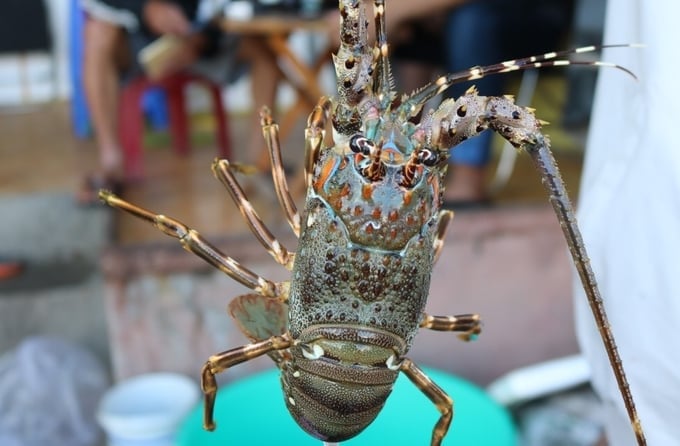
Farmers are currently engaged in blue lobster farming due to their shorter growth period compared to that of spiny lobsters. Photo: KS.
The project is currently supporting the Van Phong Aquaculture and Tourism Cooperative in Van Ninh district. Accordingly, the Institute recently signed cooperation agreements with stakeholders in the model. Subsequently, the model is expected to facilitate the consumption and export of lobsters within the province.
Mr. Nguyen Thanh Sang, Chairman of the Board of Directors of the Van Phong Aquaculture and Tourism Cooperative, reported that the cooperative comprises 32 members with approximately 4,000 cages primarily for spiny lobster farming. Additionally, the Vietnam Institute of Fisheries Economics and Planning is currently supporting the Cooperative in piloting product origin tracing for lobster products. On the other hand, the pilot model aims to enhance the Cooperative's capacities through training, guidance on disease prevention procedures, packaging processes, and transportation. Moreover, to promote linkage and consumption, the Cooperative has received guidance to conduct market research as well as materials outlining the procedures for official export to the Chinese market and other countries in the region.
According to Mr. Nguyen Tri Phuong, Deputy Director of Phu Yen province's Department of Agriculture and Rural Development, target markets for farmed lobster exports have a growing demand for strict origin traceability. However, origin tracing for Vietnamese farmed lobster is currently hindered by the lack of assignment of sea areas allocated for lobster cage farming, which is the result of inefficient planning. Furthermore, the majority of lobster farmers failed to declare and register their lobster cage farming activities, and their farming conditions failed to meet the requirements for licensing and certification.
In response to these issues, Phu Yen province is integrating lobster farming areas into the provincial planning from 2021 to 2030, with a vision towards 2050. Subsequently, the plan will facilitate the implementation of origin tracing efforts. This initiative includes disseminating and guiding farmers to strictly adhere to legal regulations. Moreover, the province will establish plans to reorganize farming areas in combination with digital transformation in management and origin tracing to meet the demands for official lobster exports.
The Song Cau Comprehensive Lobster Services Cooperative in Phu Yen province is also being supported by the Vietnam Institute of Fisheries Economics and Planning to establish a consumption value chain for lobsters.
According to Mr. Nguyen Tri Phuong, the project is currently mobilizing businesses to provide breeding stock, and export businesses have acquired codes to establish a comprehensive value chain in the near future.
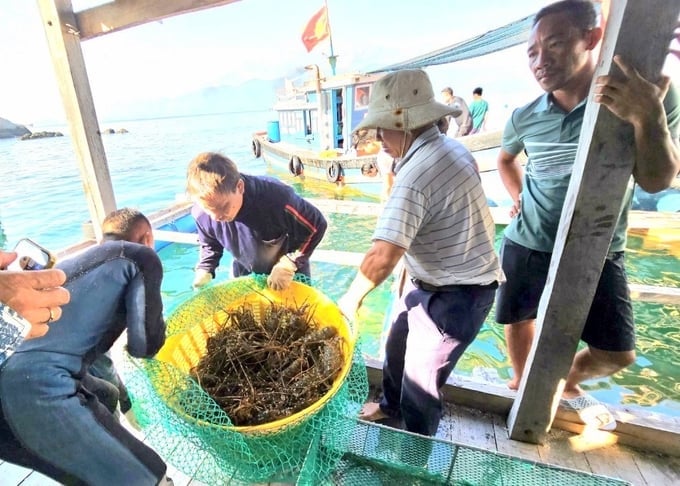
Presently, the Vietnam Institute of Fisheries Economics and Planning is currently supporting cooperatives in a pilot model in origin traceability for lobster products. Photo: KS.
With the aim of seeking new markets and reducing reliance on a single market, Phu Yen province will adjust the crop scheduling and aquaculture volume to match market demands, thereby preventing seasonal price fluctuations. On the other hand, the province aims to improve technology and production to reduce the cost of lobster farming, which will lead to reduced selling prices. Furthermore, the province is strengthening the promotion of lobster consumption in the domestic market. Encouragement for investment in processing, diversifying value-added lobster products for export to other markets such as Japan and Europe is also prioritized.
According to Mr. Nguyen Tri Phuong, with regards to the sustainable development of lobsters, Phu Yen province has been focused on reviewing and updating existing aquaculture plans and projects. The project is also planning to incorporate high-tech, onshore aquaculture areas and open-sea industrial aquaculture areas into the provincial planning from 2021 to 2030, with a vision towards 2050. This initiative will serve as a basis to reorganize current aquaculture areas in accordance with the province's socio-economic conditions and environmental capacity.
Moreover, lobster farming organizations and individuals are being encouraged to invest in infrastructure. Namely, onshore tanks are an exemplary investment target, following a successful model executed by the local Dac Loc Aquaculture Limited Liability Company.
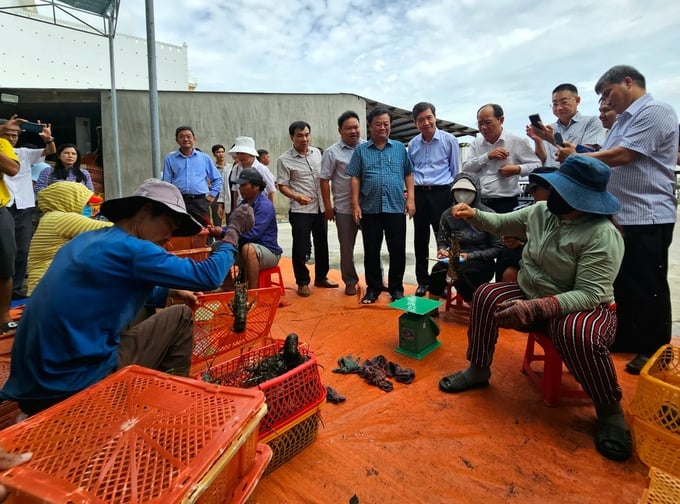
Mr. Le Minh Hoan, Minister of Agriculture and Rural Development, conducting inspection at the Song Cau Comprehensive Lobster Services Cooperative. Photo: KS.
On the other hand, the province has focused on the application of advanced scientific and technological methods, information technology, and digital advancements in the management of lobster aquaculture; preserving and fostering the province's distinctive aquatic resources; and the advancement of breeding technologies and lobster feed.
A concerted effort has been made towards establishing increasingly robust lobster cooperatives across the province. The agricultural sector, in collaboration with theVietnam Institute of Fisheries Economics and Planning, is dedicated to executing the task of "Establishing a value chain for lobster production and consumption," with the goal of constructing an efficient value chain for lobsters within the province.
Based on the reorganization of aquaculture areas, the province will promote the transition from traditional wooden cage to High-Density Polyethylene (HDPE) cages, which can adapt to climate changes and promote environmental protection.
Minister of Agriculture and Rural Development Le Minh Hoan recenrly conducted an inspection at the Song Cau Comprehensive Lobster Services Cooperative in Phu Yen province.
During the inspection, the Minister emphasized the need for the Cooperative to develop a value chain with a focus on reducing feed costs, improving quality, emphasizing brand development, and diversifying products. Accordingly, cooperatives can only be considered a collective trading group when they engage solely in purchasing and reselling. Furthermore, environmental protection is crucial in the aquacultural landscape. As a result, appropriate waste management practices without disposal into the sea are necessary. Adherence to regulated waste collection and treatment, in addition to routine environmental monitoring, is indispensable to assist communities in preventing environmental damages.
Translated by Nguyen Hai Long

(VAN) Japan's grant aid project contributes to capacity building, promoting organic agricultural production, and fostering sustainable community development in Dong Thap province.

(VAN) For years, the CRISPR-Cas9 genome technology has been reshaping genetic engineering, a precision tool to transform everything from agriculture to medicine.

(VAN) Vietnam aims to become a 'leader' in the region in the capacity and managing effectively soil health and crop nutrition.
![Reducing emissions from rice fields: [Part 1] Farming clean rice together](https://t.ex-cdn.com/nongnghiepmoitruong.vn/608w/files/news/2025/05/05/z6509661417740_a647202949c539012a959e841c03e1d3-nongnghiep-143611.jpg)
(VAN) Growing clean rice helps reduce environmental pollution while increasing income, allowing farmers to feel secure in production and remain committed to their fields for the long term.
/2025/05/19/5136-1-144800_230.jpg)
(VAN) The Nghe An Provincial People's Committee has just approved the list of beneficiaries eligible for revenue from the Emission Reductions Payment Agreement (ERPA) in the North Central region for the year 2025.

(VAN) 14 out of 35 domesticated elephants in Dak Lak province have had their living conditions improved, with 11 of them currently participating in the non-riding elephant tourism model.

(VAN) Muong Nhe Nature Reserve hopes that being upgraded to a national park will lay the foundation for forest protection efforts to be carried out in a systematic, modern, and sustainable manner.